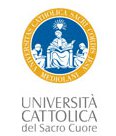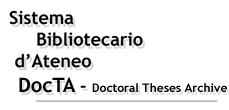|
|
DocTA - Doctoral Theses Archive >
Tesi di dottorato >
CORSO DI DOTTORATO IN SOCIOLOGIA, ORGANIZZAZIONI, CULTURE >
Citazione:
Utilizza queste indicazioni per citare o creare un link a questo documento.
|
Mezzetti, Giulia. "RELIGIOSITY AND SELF-IDENTIFICATIONS PROCESSES AMONG MUSLIMSIN ITALY", Università Cattolica del Sacro Cuore, XXXI ciclo, a.a. 2017/18, Milano, [http://hdl.handle.net/10280/74758].
|
| Titolo: | RELIGIOSITY AND SELF-IDENTIFICATIONS PROCESSES AMONG MUSLIMSIN ITALY |
| Autore/i: | MEZZETTI, GIULIA |
| Tutor: | CASELLI, MARCO
NILSSON DE HANAS, DANIEL |
| Coordinatore: | MORA, EMANUELA |
| Lingua: | ENG |
| Abstract in italiano della tesi: | La religiosità e i processi di auto-identificazione di giovani con background musulmano in Occidente soggiacciono a una doppia dinamica: da un lato, essi devono misurarsi con una narrazione negativa che dipinge l’Islam come “altro” e “diverso”; dall’altro, la loro religione subisce un processo di deculturazione (Roy 2004), ovvero lo scollegamento tra cultura e Islam in contesto di emigrazione. Sulla base di uno studio qualitativo, (60 interviste biografiche e osservazione partecipante) condotto in due città italiane (Milano e Torino), la tesi indaga come giovani con background musulmano articolino la loro appartenenza religiosa attraverso le loro pratiche quotidiane (Ammerman 2007), comparando in particolare giovani attivi nel mondo associativo religioso (impegnati in particolare come volontari o staff del ramo italiano dell’organizzazione umanitaria Islamic Relief) e giovani non interessati al coinvolgimento in organizzazioni religiose. La ricerca esamina così le pratiche religiose, nonché le risorse impiegate per la costruzione della propria identità, tra giovani musulmani “iper-visibili” (pubblicamente attivi e devoti - Jeldtoft 2013) e “non-visibili” (i cui sentimenti di appartenenza alla comunità di riferimento sono meno ovvi) sviluppando una tipologia di “riflessività religiosa” ed esplorando forme di visibilizzazione e invisibilizzazione della religiosità. |
| Abstract in inglese: | In Western countries, the religiosity and self-identification of youths with a Muslim background is shaped by a double dynamic: on one hand, they face negative discourses that cast Islam as “Different” and “Other”; on the other, their religion undergoes a process of deculturation (Roy 2004) - that is, the disconnection between culture and Islam in contexts of emigration. On the basis of a qualitative study (60 in-depth interviews and participant observation) carried out in two Italian cities (Milan and Turin), this thesis investigates how Italian descendants of Muslim migrants articulate and live their religious belonging, by analysing the “everyday lived religion” (Ammerman 2007) of youths acting as volunteers or staff members in the Italian branch of Islamic Relief (the largest Sunni international humanitarian NGOs) and of youths who are not active or involved in any religious or ethnic/national organisation. Hence, the study examines how feelings of religiosity and resources mobilized for identity-building differ between “hyper-visible” young Muslims - i.e. publicly active, vocal and devout (Jeldtoft 2013) - and “non-visible” ones - who have less of an obvious group bound. The study develops a typology of different forms of “religious reflexivity” and explores forms of visible and invisible religiosity. |
| Data di discussione: | 16-set-2019 |
| URI: | http://hdl.handle.net/10280/74758 |
| È visualizzato nelle collezioni: | CORSO DI DOTTORATO IN SOCIOLOGIA, ORGANIZZAZIONI, CULTURE
|
File in questo documento:
| File |
Dimensioni | Formato | Accessibilità |
|---|
| tesiphd_completa_Mezzetti.pdf | 7,12 MB | Adobe PDF | Visualizza/apri
|
|
Accesso e utilizzo dei contenuti di DocTA
|



